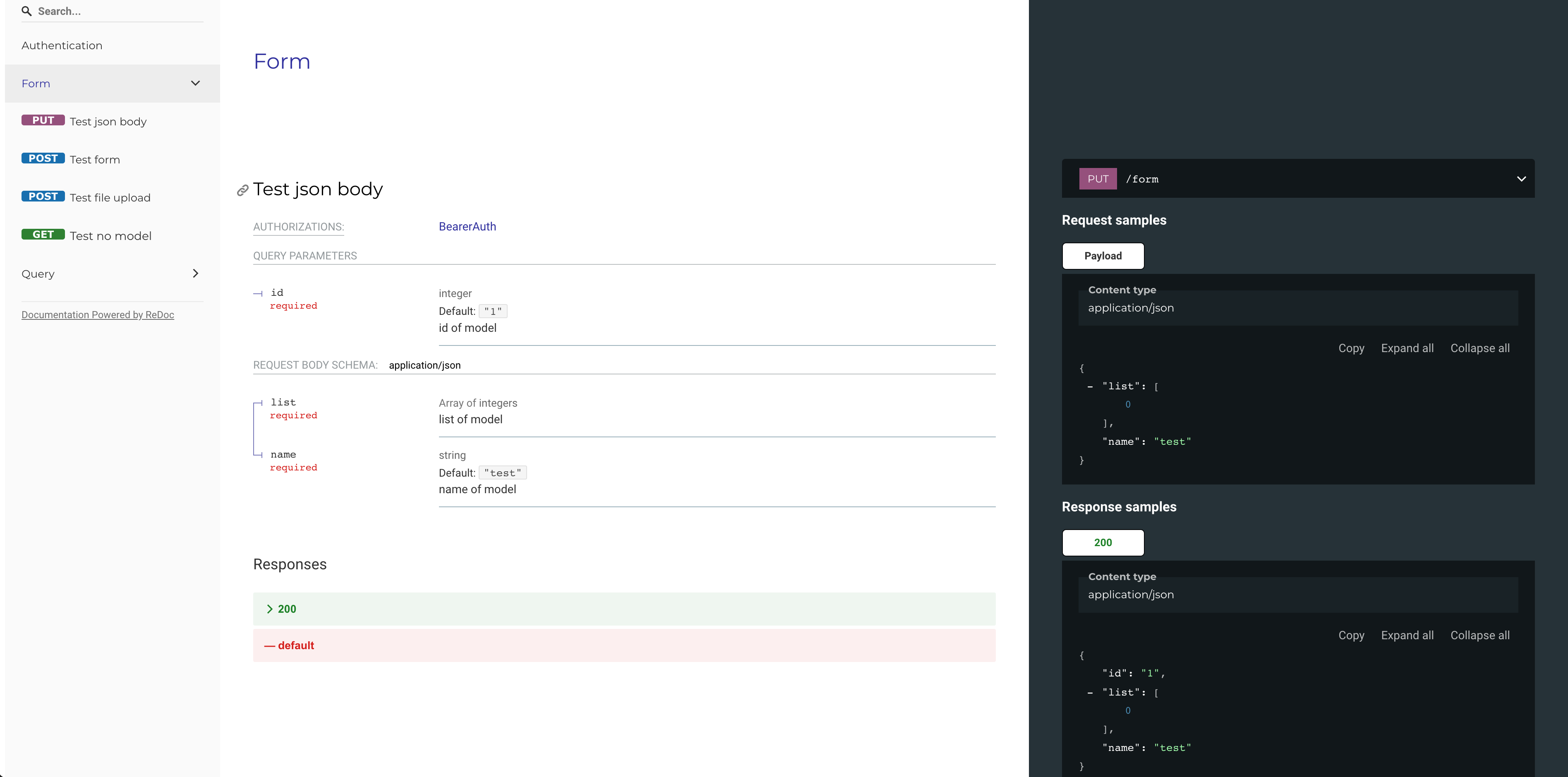Fiber + Swagger = Fibers


Introduction
Fibers is a web framework based on Fiber and Swagger inspired by FastAPI,
which wraps Fiber and provides built-in swagger api docs
and request model validation.
Why I build this project?
Previous I have used FastAPI, which gives me a great experience in api docs
generation and api writing, because nobody like writing api docs.
Now I use Fiber but I can't found anything like that, I found swag but which write
docs with comment is so stupid. So there is Fibers.
Requirements
- Go >= 1.18, because of generic usage.
Installation
go get -u github.com/long2ice/fibers
Online Demo
You can see online demo at https://fibers.long2ice.io/docs or https://fibers.long2ice.io/redoc.


And you can see the code in examples.
Usage
Build Swagger
Firstly, build a swagger object with basic information.
package examples
import (
"github.com/getkin/kin-openapi/openapi3"
"github.com/long2ice/fibers/swagger"
)
func NewSwagger() *swagger.Swagger {
return swagger.New("Fibers", "Swagger + Fiber = Fibers", "0.1.0",
swagger.License(&openapi3.License{
Name: "Apache License 2.0",
URL: "https://github.com/long2ice/fibers/blob/dev/LICENSE",
}),
swagger.Contact(&openapi3.Contact{
Name: "long2ice",
URL: "https://github.com/long2ice",
Email: "long2ice@gmail.com",
}),
swagger.TermsOfService("https://github.com/long2ice"),
)
}
Write API
Then make func which is type F func(c *fiber.Ctx, req T) error.
package examples
import "github.com/gofiber/fiber/v2"
type TestQueryReq struct {
Name string `query:"name" validate:"required" json:"name" description:"name of model" default:"test"`
}
func TestQuery(c *fiber.Ctx, req TestQueryReq) error {
return c.JSON(req)
}
// TestQueryNoReq if there is no req body
func TestQueryNoReq(c *fiber.Ctx) error {
return c.SendString("xxx")
}
| name |
description |
query |
binding query param |
cookie |
binding cookie param |
form |
binding form param |
json |
binding json body |
uri |
binding path param |
header |
binding header param |
validate |
validator support |
description |
swagger docs param description |
example |
swagger docs param example |
default |
swagger docs param default value |
embed |
embed struct params or body |
Note that the attributes in TestQuery? Fibers will validate request and inject it automatically, then you can use it
in handler easily.
Write Router
Then write router with some docs configuration and api.
package examples
var query = router.New(
TestQuery,
router.Summary("Test Query"),
router.Description("Test Query Model"),
router.Tags("Test"),
)
// if there is no req body
var query = router.NewX(
TestQueryNoReq,
router.Summary("Test Query"),
router.Description("Test Query Model"),
router.Tags("Test"),
)
Security
If you want to project your api with a security policy, you can use security, also they will be shown in swagger docs.
Current there is five kinds of security policies.
BasicBearerApiKeyOpenIDOAuth2
package main
var query = router.New(
TestQuery,
router.Summary("Test query"),
router.Description("Test query model"),
router.Security(&security.Basic{}),
)
Then you can get the authentication string by c.Locals(security.Credentials) depending on your auth type.
package main
import "github.com/gofiber/fiber/v2"
func TestQuery(c *fiber.Ctx, req TestQueryReq) error {
user := c.Locals(security.Credentials).(security.User)
fmt.Println(user)
return c.JSON(req)
}
Mount Router
Then you can mount router in your application or group.
package main
import "github.com/gofiber/fiber/v2"
func main() {
app := fibers.New(NewSwagger(), fiber.Config{})
queryGroup := app.Group("/query", fibers.Tags("Query"))
queryGroup.Get("", query)
queryGroup.Get("/:id", queryPath)
queryGroup.Delete("", query)
app.Get("/noModel", noModel)
}
Start APP
Finally, start the application with routes defined.
package main
import (
"github.com/gin-contrib/cors"
"github.com/gofiber/fiber/v2"
"github.com/long2ice/fibers"
)
func main() {
app := fibers.New(NewSwagger(), fiber.Config{})
app.Use(
logger.New(),
recover.New(),
cors.New(),
)
subApp := fibers.New(NewSwagger(), fiber.Config{})
subApp.Get("/noModel", noModel)
app.Mount("/sub", subApp)
app.Use(cors.New(cors.Config{
AllowOrigins: "*",
AllowMethods: "*",
AllowHeaders: "*",
AllowCredentials: true,
}))
queryGroup := app.Group("/query", fibers.Tags("Query"))
queryGroup.Get("/list", queryList)
queryGroup.Get("/:id", queryPath)
queryGroup.Delete("", query)
app.Get("/noModel", noModel)
formGroup := app.Group("/form", fibers.Tags("Form"), fibers.Security(&security.Bearer{}))
formGroup.Post("/encoded", formEncode)
formGroup.Put("", body)
formGroup.Post("/file", file)
log.Fatal(app.Listen(":8080"))
}
That's all! Now you can visit http://127.0.0.1:8080/docs or http://127.0.0.1:8080/redoc to see the api docs. Have
fun!
Disable Docs
In some cases you may want to disable docs such as in production, just put nil to fibers.New.
app = fibers.New(nil, fiber.Config{})
SubAPP Mount
If you want to use sub application, you can mount another SwaGin instance to main application, and their swagger docs
is also separate.
package main
import "github.com/gofiber/fiber/v2"
func main() {
app := fibers.New(NewSwagger(), fiber.Config{})
subApp := fibers.New(NewSwagger(), fiber.Config{})
subApp.Get("/noModel", noModel)
app.Mount("/sub", subApp)
}
ThanksTo
- kin-openapi, OpenAPI 3.0 implementation for Go (parsing, converting,
validation, and more).
- Fiber, Express inspired web framework written in Go.
License
This project is licensed under the
Apache-2.0
License.
 Documentation
¶
Documentation
¶

